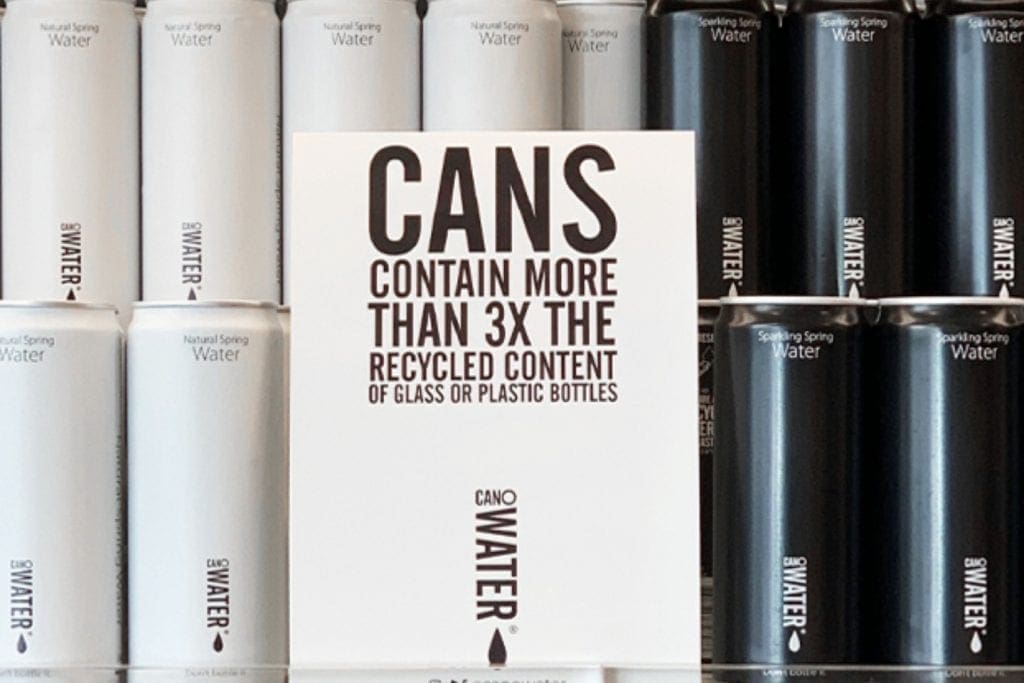The cans, which are black or white in colour, will be on sale in two varieties—one disposable option with an aluminium ring pull, the other with a plastic resealable cap, enabling the can to be refilled and reused, just like a plastic water bottle.
CanO Water is likely to go on sale for between S$1.65 and S$1.85 for a 330ml can, slightly more expensive than plastic bottled water, which is priced at around S$1.55, depending on the brand.
“Aluminium is the closest thing to a closed-loop material available on the market,” said David Ward, founder and managing director of The Nurturing Company, which represents the CanO Water brand and bamboo toilet tissue Bambooloo in Southeast Asia.
Aluminium is the world’s most recyclable packaging material. Though energy intensive to produce, about three-quarters of all aluminium ever produced has been recycled, compared to 9 per cent of all plastics.
Polyethylene terephthalate (PET) plastic, which is used to make plastic water bottles, is among the most recyclable kinds of plastic, with about half of the material recycled globally.
But will the cans actually be recycled?
One challenge for CanO Water in Singapore will be convincing consumers that the cans will actually be recycled, as much of the material placed in the city-state’s recycling bins cannot be recycled due to contamination with food or liquid and end up being incinerated.
Ward noted that aluminium cans, even in Singapore, are usually recycled, as they can be separated from other recyclables using magnets at material recovery facilities and shipped overseas for recycling. Even at Singapore’s incineration plants, aluminium cans are usually recovered for recycling in the same way, he said.
As for the plastic caps on the resealable cans, they too have recycling value, or are separated or burned off during the aluminium shredding and smelting process, Ward explained.
Another issue is the carbon footprint of CanO Water, which is imported from Europe. The water in the cans is sourced from European water bodies, then shipped to Asia.
“It’s not a perfect world. In a year’s time, we hope to have identified an aquifer spring we can work with in Asia. But it has to be close to a sea port [to reduce emissions from road transport],” he said, adding that shipping is the most carbon-efficient form of transport.
Ward noted that most packaged water brands in Singapore, with the exception of some brands like Evian and Ice Mountain, sell water processed through a purification technique known as reverse osmosis, so it is essentially the same as Singapore’s famously clean tap water. CanO Water water is spring water, sourced from the Alps.
CanO Water will be marketed initially through social media. The brand has about 40,000 followers on Instagram.
“Our target market is anyone who buys plastic packaged water. I drink water using a refillable container every day, but the reality is I’m in the minority [in Singapore]. We want to reduce one-time use plastic wherever we can, and Singapore is a country that needs to see plastic reduction happen,” he said.
One of the biggest market opportunities for canned water will be hotels, which readily give away bottled water for free to their customers.
Ward said that the average hotel in Singapore gives away about 500,000 plastic bottles of water a year as part of their service to guests, and because of the heat and humidity in the tropical country.
“If you walk into any major hotel in Singapore, nine times out of 10 they’ll give you a bottle of water, as service and reputation is paramount. It’s a great solution, but it leaves a bitter aftertaste [because of its environmental footprint].”
“Hotel brands are making grandiose promises about reducing single-use plastic, but they’re not the ones who have to put these promises into play—it’s the franchise owners, who have to deliver on these promises.”
“It’s not easy. There’s always a to-and-fro between the supplier, the hotel’s procurement department, and the sustainability department. But in some hotels, plastic bottled water has already become a point of friction. Customers are asking why they have got plastic bottled water in their rooms? Most guests won’t accept it [single-use plastic bottles] in the future,” he said.
The news of CanO Water’s launch emerges a few weeks after Marina Bay Sands, Singapore’s largest hospitality group, chose single-use plastic bottles to serve their customers water for a further two years after a procurement tender for a new water supplier.
The hotel told Eco-Business that PET, which it chose over CanO Water and TetraPak packaged water, was the most sustainable option in the Singapore context following a life-cycle analysis of the available options.
Source: Eco-Business









